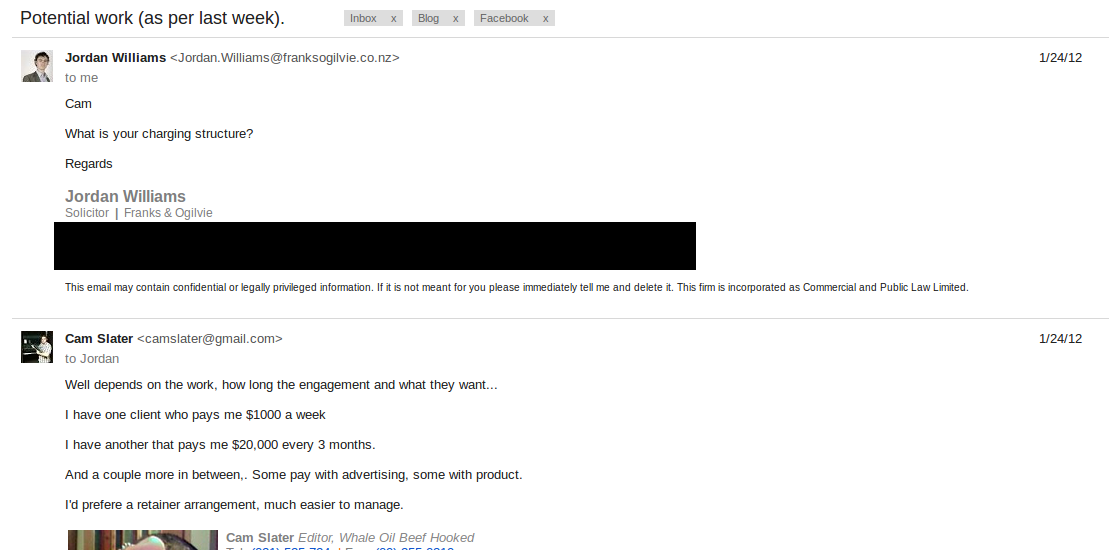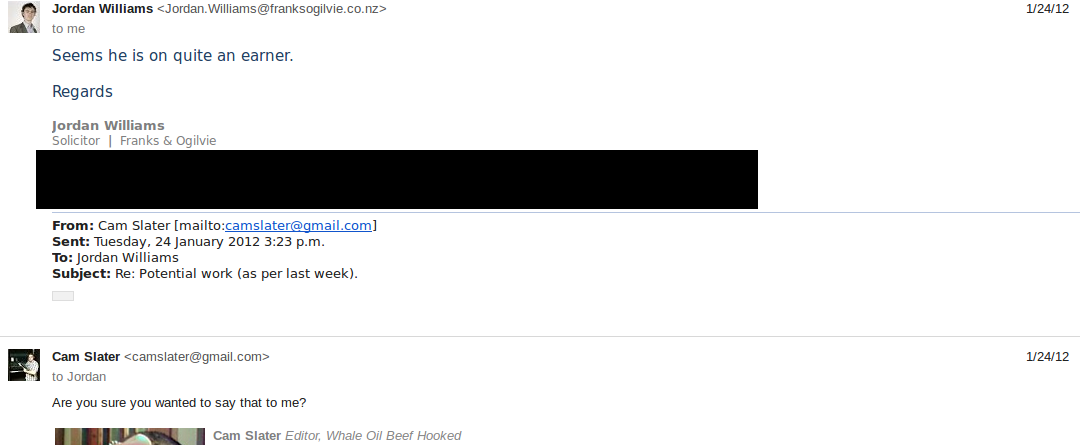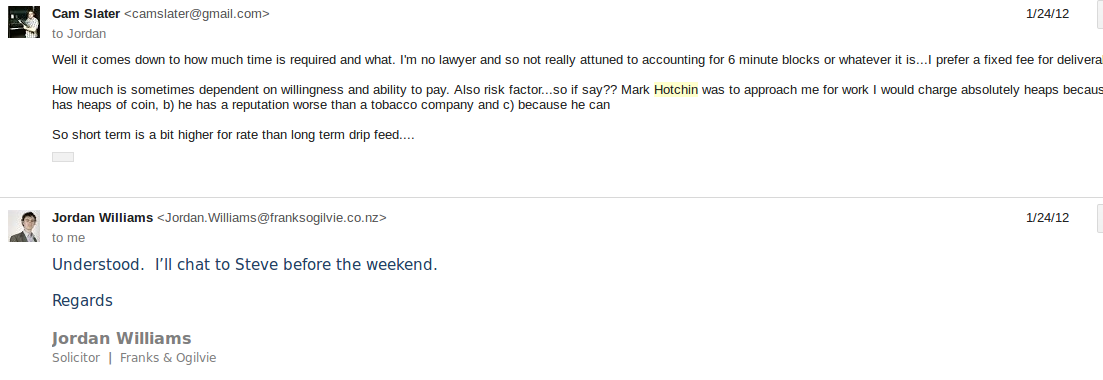UPDATE: Just hours after Twitter suspended, @Whaledump, the hacker apparently behind the Dirty Politics email leaks has returned to the social network as Whaledump2.
While a rival account also emerged, called WhaledumpNZ, Whaledump2 quickly released screen shots of an email from Carrick Graham and a calendar invite to establish his (or her) bona fides.
The email and the meeting, in a zip folder titled "DB" relate to a "hit" on Independent Liquor (a hit being Dirty Politics parlance for a payment for a Whale Oil blog post attacking a company).
Whaledump2 quickly followed that up with a second dump, this time four screen shots of what are apparently emails between Jordan Williams and Whale Oil blogger Cameron Slater.
Mr Williams asks "What's your charging structure?" Mr Slater replies: "I have one client who pays me $1000 a week. I have another who pays me $20,000 every three months."

(Click to zoom)

(Click to zoom)


(Click to zoom)
Mr Williams hung up on NBR when asked for comment.
On Twitter, he posted, "Re: Whaledump material - I reviewed the material and made the necessary apologies some weeks ago."
The emails in the screen shots released this morning were from Mr Williams' work account. His employer at the time was Wellington law firm Franks & Ogilvie. Principal Stephen Franks said he had no comment.
Meanwhile, Police spokesman Grant Ogilvie tells NBR, "Police has not been involved in the suspension of the Whaledump twitter account."
The PM's office has also said it had no prior knowledge of the suspension.
Mr Slater says he did complain to Twitter about the account, which he saw as a a "breach of copyright and breach of privacy ... both against Twitter's rules".
However, the social network has yet to reply to NBR's query, and it is not clear if the suspension was in reaction to Mr Slater's take-down request.
What do you think? Are you being more careful with your email post Dirty Politics? Click here to vote in our subscriber-only business pulse poll.
EARLIER: Twitter has suspended @Whaledump, the account used by the individual claiming to be the Dirty Politics hacker.
The account has been used to promote links to screen shots of emails hacked from Whale Oil blogger Cameron Slater's computer earlier this year.
It will be relatively trivial for the person behind Whaledump to create a new account (and another and another if each is snuffed out) to keep distributing images.
But it's interesting that Twitter has actively waded into the political and legal controversy.
I've asked for comment from Twitter's nearest office (in Australia). Will let you know if I hear anything.
Whaledump's final tweet, the enigmatic "Pop. Pop. Pop." was made at 9am this morning.
More substantive previous tweets by @Whaledump have led to new questions about the actions of various players in Nicky Hager's Dirty Politics, including Mr Slater, ex-Justice Minister Judith Collins, Mark Hotchin, former PM staffer Jason Ede, Food & Grocery Council CEO Katherine Rich and PR operator Carrick Graham.
A new account WhaledumpNZ was almost immediately created, but there was not clear sign that the same person was behind. It has not posted any links to leaked emails or other substantive information, although it has made plenty of general tweets railing against Whaledump's suspension. It was quickly followed by another account, Whaledump2.
Mr Slater asked police to investigate the hacker.
Police did not immediately reply to a request for comment.
Mr Slater also complained to Twitter, on the basis that Whaledump's posts of screen shots of his email were a "breach of copyright and breach of privacy ... both against Twitter's rules".
A spokesman the Prime Minister's office had no knowledge of the suspension prior to the account being shut down.
"We did not lay a complaint and it's not a matter for us."
Mr Slater tweeted this morning, "And @whaledump is dead...good job".
ckeall@nbr.co.nz
POSTSCRIPT
There was initially a degree of confusion, with Whaledump displaying as suspended via Twitter's website and Tweetdeck, but displaying as a protected account on Twitter apps. Developer Michael Koziarski says "that's because apps that’s apps don’t have a specific error code for suspended. It’s suspended, not protected."






